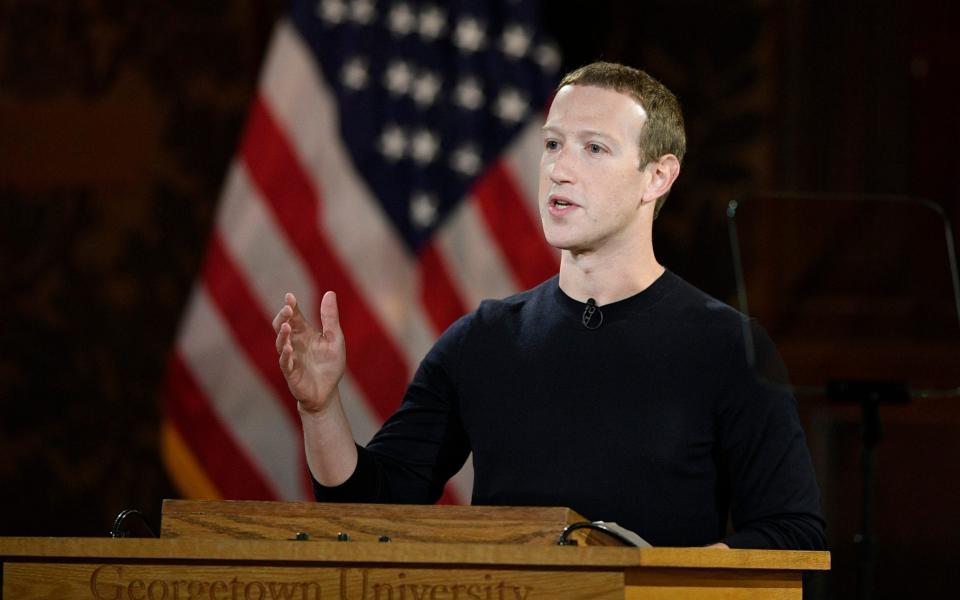Why Facebook will weather the widespread advertising boycott

An advertising boycott of Facebook has seen a surge in support from some of the world’s biggest brands, and even members of the Royal Family.
More than 150 companies have pledged to stop advertising spending on the social network. The campaign, led by “Stop Hate for Profit”, is pushing for hate speech to be removed from the site and has gained the private backing of the Duke and Duchess of Sussex.
The biggest advertisers joining the boycott accounted for just under $245m (£200m) in Facebook advertising last year, according to analyst firm Pathmatics. Since the start of the year, they had spent more than $66m.
“Three weeks ago, this was a barely-hatched idea,” the pressure group said. “Now, 150 plus companies have decided to stop advertising spending on Facebook for at least a month and British royalty is helping make it happen.”
By Friday last week, it had gained significant momentum. Ad buyers including Unilever, Coca-Cola and Verizon had come out saying they would cut advertising on social media.
On Saturday, FTSE 100 distiller Diageo joined the boycott and on Sunday, it was Starbucks, the Seattle barista chain, which said it would pause all advertising on social media.
“The worry is it’s a bushfire that will spread,” says Dan Ives, an analyst at Wedbush. “For Facebook and Mark Zuckerberg, right now, it should be about stemming the bleeding in terms of advertisers leaving the platform, and making sure it’s temporary and not longer term.”
This might prove a tough task. After all, the campaign “Stop Hate for Profit” is piling on the pressure, attempting to appeal to companies outside of the US to follow suit.
The campaign, set up by America’s anti-right wing pressure group the Anti-Defamation League, is urging advertisers to cut ties with Facebook, at least for July.
All this comes in the wake of Black Lives Matter protests, and in particular a backlash against Facebook’s decision to leave a controversial post by US President Donald Trump online.
“When the looting starts, the shooting starts,” the post read, seen as a direct threat to Black Lives Matter protesters in Minneapolis. Twitter had censored the same post on its site, citing incitement of violence.
Yet the “Stop Hate for Profit” campaign goes further than this in calling for change. There are other gripes, such as Facebook allowing right wing publication Breitbart to be considered a “trusted news source”. It has set out a series of “recommended next steps” for Facebook.
There is a very real risk for Facebook that such a campaign could snowball, following years of wrangling between advertisers and tech firms about how their ads appear alongside content. “After all, it will ultimately be beneficial for them to get social media firms to sort their platforms out as well,” says one advertising veteran.
Zuckerberg appears rattled. Last week, he made moves to placate the rebellion, holding calls with top advertisers and civil rights organisations in a bid to restore order.
On Friday, Facebook also announced it would be introducing further bans on racist advertising, in particular a loophole that allowed ads that claimed specific races, genders or other protected characteristics presented a threat.
Yet, it might not be the larger advertisers who are making Zuckerberg nervous. After all, those companies who have pulled spending are unlikely to make a dent in Facebook’s topline.
Just last quarter, the social media giant made $17bn in revenue, more than 20 times Twitter’s first quarter revenue. Over the month of July, the combined advertising boycott would amount to a hit of just over $20m, based on Pathmatics’ data.
The vast majority of Facebook’s revenue, in fact, comes from a “long tail” of small and medium sized firms that are unlikely to abandon Facebook en-masse.
Colin Sebastian, an analyst at Baird who monitors Facebook, says the company has “about eight million advertisers”, and currently just 150 have chosen to boycott the social media firm.
“Their bread and butter is small and medium sized businesses. If (or when) this ‘long tail’ of advertisers joins the boycott, then I would be more concerned about the potential financial impact on Facebook and other social media.”
Right now, this does not look on the cards. One smaller company which advertises with Facebook said it could not imagine waves of SMEs following suit.
“If you’re a smaller business, I don’t know how Facebook wouldn’t be in your repertoire,” they said. “There’s nothing else which can target at that level that Facebook does with such consummate ease.”
Its reach is indisputable. The social network has a huge user-base across multiple channels - be it via its Facebook site, or Instagram, or WhatsApp. During the Covid-19 pandemic, Zuckerberg has said around three billion people were using at least one of its apps. If brands want to be “social”, experts say, there are very few other avenues to do so other than through Facebook.

For now, the reliance of such companies on Facebook to reach their customers may provide some support to Zuckerberg. In the longer-term, there are those who say he shouldn’t be too concerned.
After all, how committed larger firms are to “Stop Hate For Profit” remains to be seen. Companies were already reining in spend around Covid-19 anyway, one industry expert says.
“Do brands use this as an opportune moment to go, we’re spending less anyway post-Covid, this would make us look pretty good? I don’t know.”
Michael Hewson at CMC Markets says there is some truth in this. Whilst it is “probably a minority view”, he says, “a lot of it may be virtue signalling”.
Facebook may appear at risk now, the backlash against the social network site ramping up, a seemingly Herculean task ahead of it to regain trust. But, if the past decade showed anything, with Facebook facing Cambridge Analytica and the DeleteFacebook campaign, it is that it may be too soon to write the firm off.

 Yahoo Finance
Yahoo Finance 